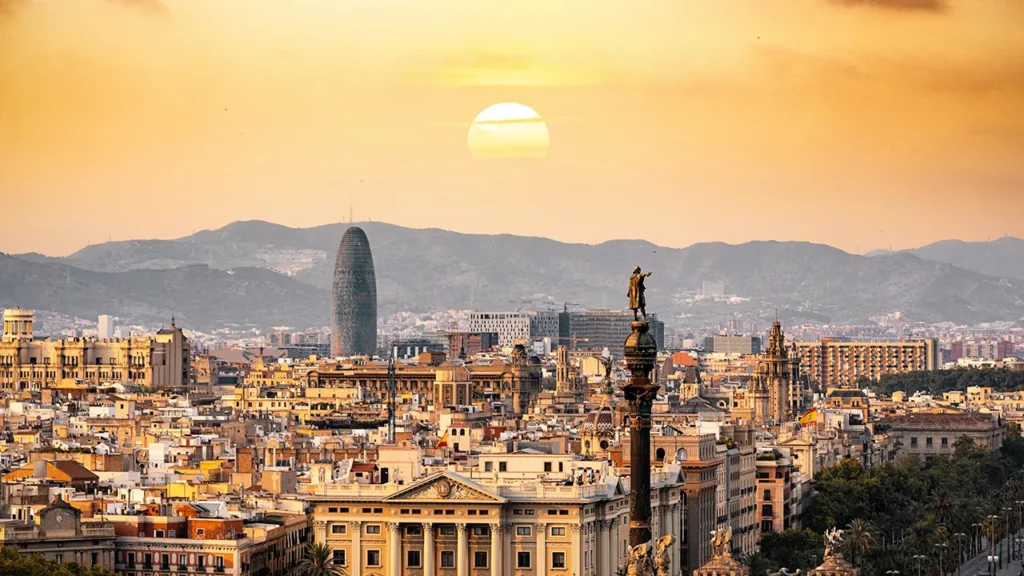Table of Contents
Barcelona has emerged as a pioneer in the field of smart city development, demonstrating how technology can revolutionize urban life. Not only has this Mediterranean metropolis embraced cutting-edge innovation, it has also redefined the concept of a smart city, placing citizen empowerment at its core. Let’s explore Barcelona’s journey to becoming a beacon of urban intelligence and how it continues to shape the future of smart urban living.
The genesis of Barcelona’s smart city initiative
Barcelona’s transformation into a technologically advanced urban center began more than a decade ago, making it one of Europe’s early adopters of smart city technologies. This forward-thinking approach set the stage for a digital revolution that would reshape urban life in countless ways.
Early experiments with digital infrastructure
In the early stages of its smart city journey, Barcelona focused on laying the foundation for a connected urban environment. The city government invested heavily in deploying an extensive network of sensors throughout the metropolitan area. These sensors were designed to collect a wide range of data, including:
- Traffic patterns and public transportation usage
- Energy consumption trends
- Environmental noise levels
- Water consumption and irrigation needs
This data collection initiative was designed to provide both the government and private sector with valuable insights into urban dynamics, enabling more informed decision making and resource allocation.
Building a robust technological foundation
As Barcelona’s smart city vision took shape, the focus expanded beyond mere data collection. The city developed several key technological assets that would serve as the backbone of its digital transformation:
- Open Data Portal: A comprehensive platform that makes city data available to the public, fostering transparency and innovation.
- Air Quality Monitoring Network: A sophisticated system of sensors that provides real-time information on air pollution levels throughout the city.
- Public Wi-Fi Infrastructure: An extensive network that provides free Internet access to residents and visitors alike, bridging the digital divide.
These initiatives have positioned Barcelona as one of the most technologically advanced cities in the world, rivaling the digital infrastructures of global hubs such as New York City, Singapore and Seoul.
The smartphone revolution: Bringing smart city services to citizens’ pockets
As smartphone adoption skyrocketed, Barcelona recognized the potential to deliver smart city services directly to its residents’ fingertips. This shift marked a new era in the city’s digital strategy, focusing on developing mobile applications that could enhance various aspects of urban life.
Empowering citizens through mobile technology
The proliferation of smartphones enabled Barcelona to create a suite of applications addressing diverse urban needs:
- Employment: Job search platforms and career development resources
- Housing: Real-time property listings and rental assistance services
- Administrative Services: Digital platforms for civic engagement and bureaucratic processes
- Mobility: Real-time public transport information and smart parking solutions
- Healthcare: Telemedicine services and health information dissemination
- Security: Emergency alert systems and community safety networks
- Utilities: Smart metering and consumption monitoring tools
These applications not only improved the efficiency of city services but also fostered a more connected and engaged citizenry.
Quantifying the impact of smart city applications
A comprehensive study by McKinsey & Company identified 55 distinct smart city applications across various sectors. The research suggested that these digital solutions could potentially enhance urban quality of life by 10-30%, underscoring the transformative power of technology in urban environments.
Barcelona’s adoption of these technologies placed it among the world’s leading smart cities. However, even the most advanced urban centers have only implemented 60-70% of available smart city technologies. Consequently, this indicates significant room for further innovation and growth.
Barcelona’s democratic turn: A new chapter in smart city governance
The election of Ada Colau as mayor in 2015 marked a pivotal moment in Barcelona’s smart city narrative. Under her leadership, the city embarked on a new phase that prioritized democratizing urban governance through digital tools.
Redefining smart city priorities
Mayor Colau’s administration shifted focus from purely technological advancements to leveraging digital innovations for enhancing civic participation. Key elements of this new approach included:
- Emphasizing open data and open standards as fundamental principles
- Recruiting civic-minded technologists and cryptographers to work within city hall
- Appointing Francesca Bria as Chief Technology and Digital Innovation Officer to spearhead this new vision
Prioritizing privacy and data sovereignty
In response to growing concerns about data privacy and corporate control of urban information, Barcelona’s new smart city strategy placed a strong emphasis on:
- Data security and privacy protection for citizens
- Ensuring data sovereignty for the city and its residents
- Transparent and accountable use of technology in urban governance
This approach aimed to create a smart city that served its citizens on their own terms. Rather than being driven solely by technological imperatives or corporate interests, it focused on the needs and preferences of the residents.
Decidim: Barcelona’s digital democracy platform
One of the most significant outcomes of Barcelona’s new smart city approach has been the development of Decidim, a digital participatory platform whose name means “We Decide” in Catalan. This innovative tool exemplifies the city’s commitment to technology-enabled civic engagement.
Decidim offers a number of features designed to facilitate direct citizen participation in urban governance:
Idea submission: Citizens can propose new initiatives or policy changes
Public debate: Open forums to discuss proposed ideas and ongoing city projects
Voting mechanism: Allows residents to express support or opposition to proposals
Transparency tools: Track progress and implementation of citizen-initiated projects
The introduction of decidim has had a profound impact on Barcelona’s decision-making processes:
- More than 70% of the proposals on the platform come directly from citizens.
- More than 40,000 residents have actively participated in shaping the city’s policies
- The platform has been used to create significant parts of the government’s agenda.
This level of citizen engagement represents a radical shift in urban governance and demonstrates the potential of digital tools to enhance democracy in the context of smart cities.
Barcelona’s citizen-centric approach
Reversing the smart city paradigm, Barcelona has adopted a citizen-centric approach under the leadership of Francesca Bria. This new strategy fundamentally rethinks the relationship between technology and urban governance, prioritizing the alignment of technology initiatives with the city’s broader social and political goals. A key aspect of this approach is data sovereignty and public ownership.
Barcelona’s revised smart city contracts now include clauses that ensure the city maintains control over the data generated by its smart city infrastructure, ensuring that urban data serves the public interest rather than private profit. To empower citizens through data control, the city has developed tools that allow residents to manage the data they produce through their interactions with urban systems. These tools enable citizens to choose specifically who they share their data with, enhancing privacy and personal autonomy. This approach is exemplified by the EU-funded DECODE (Decentralized Citizen-owned Data Ecosystems) project, which Barcelona has been at the forefront of implementing.
Comparing Barcelona’s digital engagement to global counterparts
While Barcelona has made significant strides in citizen engagement through digital tools, studies suggest that awareness and usage of these technologies still lag behind some global leaders.
Awareness and usage patterns
The McKinsey report on smart cities revealed that European cities, including Barcelona and Amsterdam, exhibit lower awareness and usage of digital urban tools compared to cities like San Francisco, Seattle, and New York City. This gap is even more pronounced when compared to Asian cities such as Beijing, Shanghai, and Shenzhen.
Factors influencing digital adoption
Several factors contribute to the differences in digital engagement observed between European cities and their counterparts in other regions. Cultural preferences play a significant role, as many European cities have strong traditions of face-to-face interactions for civic services. Additionally, the quality of existing infrastructure for traditional service delivery methods may reduce the perceived need for digital alternatives. Moreover, varying levels of digital literacy across different demographics can impact the adoption and usage of digital urban tools. Understanding these factors is critical for Barcelona as it continues to refine its smart city strategy and increase digital engagement among its residents.
Barcelona’s smart city evolution: From technology-driven to citizen-empowered
Barcelona’s journey exemplifies the evolution of smart city concepts, moving through distinct phases that reflect changing priorities and understanding of urban technology.
Smart City 1.0: The promise of technology
In its early stages, Barcelona, like many cities, was captivated by the potential of technology to transform urban life. This phase was characterized by:
- Belief in technology as a universal solution to urban challenges
- Widespread sensor deployment
- Focus on data collection and analysis
Smart City 2.0: Problem-solving through technology
As the smart city concept matured, Barcelona began to view technology more as a toolset for addressing specific urban issues. This phase saw:
- Reduced emphasis on ubiquitous sensor networks
- More targeted application of technology to urban problems
- Integration of smartphones as key components of the smart city ecosystem
Smart City 3.0: Citizen engagement and empowerment
Barcelona’s current approach represents the cutting edge of smart city thinking, focusing on:
- Using digital tools to enhance civic participation
- Empowering citizens to initiate and drive technological solutions
- Prioritizing data privacy and sovereignty
This evolution demonstrates Barcelona’s commitment to remaining at the forefront of smart city innovation while adapting its approach to better serve its citizens.
Innovative smart city solutions in Barcelona
Barcelona’s smart city initiatives extend beyond digital governance to include a wide range of innovative solutions that enhance urban life, demonstrating the city’s holistic approach to urban intelligence. One notable project is the implementation of adaptive street lighting that responds to environmental conditions and human activity. Motion sensors detect the presence of pedestrians and vehicles, allowing the light intensity to adjust automatically, brightening when needed and dimming during low-activity periods. This system significantly reduces energy consumption while maintaining public safety.
To address urban congestion and improve mobility, Barcelona has deployed a smart parking system. Sensors embedded in parking spots detect vehicle presence and transmit real-time availability data to a mobile app. This allows drivers to quickly locate free parking spaces, reducing traffic and emissions from circling vehicles.
Barcelona’s waste management system also incorporates cutting-edge technology to improve efficiency and urban cleanliness. In some areas, underground vacuum waste collection systems eliminate the need for traditional garbage trucks. Additionally, smart sensors in waste containers monitor fill levels and optimize collection routes, reducing noise pollution, improving air quality, and enhancing the urban aesthetic.
These innovations showcase Barcelona’s commitment to leveraging technology to create a more livable, sustainable, and efficient urban environment.
The Economic impact of Barcelona’s smart city initiatives
While the primary goal of Barcelona’s smart city projects is to improve quality of life for residents, these initiatives also have significant economic implications for the city.
Cost savings through efficiency
Smart city technologies hold significant promise for generating substantial savings for urban administrations. By implementing energy-efficient lighting and smart grid systems, cities can reduce utility costs. Additionally, optimized waste collection and water management can lower operational expenses. Improved traffic management also plays a crucial role in reducing infrastructure wear and maintenance needs. Research indicates that cities could save billions annually through the adoption of these smart technologies, with Barcelona poised to be a major beneficiary of these efficiencies.
Attracting investment and innovation
Barcelona’s reputation as a smart city leader has made it an attractive destination for technology companies and startups:
- The city hosts numerous smart city conferences and expos, drawing global attention
- Innovative companies are drawn to Barcelona to test and showcase their urban technologies
- This ecosystem fosters job creation and economic growth in the technology sector
Challenges and investments
While the long-term economic benefits are promising, implementing smart city technologies requires significant upfront investment. The global smart city market is projected to attract billions in investment over the coming years. Barcelona must balance the costs of implementing new technologies with the expected returns. Partnerships with private sector companies like Microsoft and Cisco help offset some of these costs. By strategically investing in smart city technologies, Barcelona aims to create a more efficient, sustainable, and economically vibrant urban environment.
Looking to the future: Barcelona’s ongoing smart city evolution
As Barcelona continues to refine and expand its smart city initiatives, several key areas are likely to shape the future of urban intelligence in the Catalan capital.
Artificial intelligence and machine learning
The integration of AI and machine learning into urban systems presents exciting possibilities:
- Predictive maintenance of infrastructure to prevent failures and reduce costs
- Advanced traffic management systems that adapt in real-time to changing conditions
- Personalized public services tailored to individual citizen needs and preferences
5G and enhanced connectivity
The rollout of 5G networks will enable new levels of urban connectivity:
- Ultra-fast, low-latency communications supporting real-time data processing
- Enhanced support for Internet of Things (IoT) devices across the city
- New possibilities for augmented and virtual reality applications in urban planning and tourism
Sustainability and climate resilience
Barcelona is likely to increase its focus on using smart technologies to address environmental challenges:
- Advanced environmental monitoring systems to track air quality, noise pollution, and urban heat islands
- Smart grid technologies to increase renewable energy integration and improve energy efficiency
- Intelligent water management systems to conserve resources and prevent flooding
Continued focus on citizen empowerment
Building on the success of initiatives like Decidim, Barcelona is likely to expand its efforts to involve citizens in urban decision-making. This includes the development of new digital platforms for civic engagement and participatory budgeting, as well as the integration of blockchain technology to enhance transparency and trust in urban governance. Furthermore, the expansion of digital literacy programs will ensure that all citizens can participate in the smart city. As Barcelona moves forward, its commitment to balancing technological innovation with citizen empowerment and democratic values will continue to shape its evolution as a smart city. The lessons learned and models developed in Barcelona are likely to influence urban development strategies around the world, cementing the city’s status as a pioneer in the smart city movement.
Literature
- Urban Planning, Ecological Transition, Urban Services and Housing: https://ajuntament.barcelona.cat/ecologiaurbana/en/noticia/smart-city-2023-shows-a-barcelona-at-the-forefront-of-urban-innovation_1342636
- A Smart City Initiative: the Case of Barcelona: https://link.springer.com/article/10.1007/s13132-012-0084-9
- Barcelona Smart City Agenda 2030: https://www.viasmartcities.com/smart-city-barcelona/
- Barcelona: Digital innovation to build the future: https://ajuntament.barcelona.cat/imi/en/smart-city/barcelona-digital-innovation-build-future
- Barcelona’s Digital Democracy: https://cityqualitymagazine.com/barcelonas-digital-democracy/
- How Smart City Barcelona Brought the Internet of Things to Life: https://datasmart.hks.harvard.edu/news/article/how-smart-city-barcelona-brought-the-internet-of-things-to-life-789
- decidim.barcelona: https://ajuntament.barcelona.cat/innovaciodemocratica/en/decidimbarcelona
- Why Barcelona is a smart city beyond its tech: https://www.here.com/learn/blog/barcelona-smart-city-2020
- Going Beyond the Smart City? Implementing Technopolitical Platforms for Urban Democracy in Madrid and Barcelona: https://www.tandfonline.com/doi/pdf/10.1080/10630732.2020.1786337




